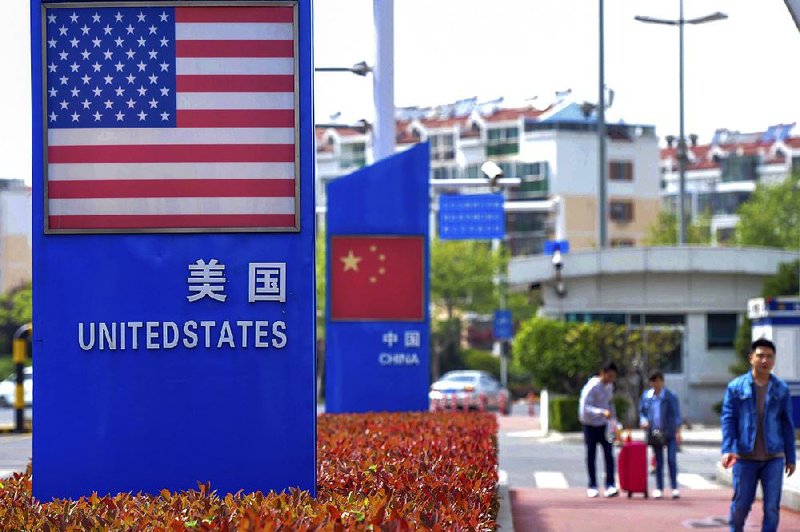WASHINGTON -- Trade talks between the United States and China resumed Monday with prospects dimming for a transformative deal, as both sides appeared more focused on preventing tensions from escalating before the 2020 presidential election than on resolving their differences.
Negotiators from both countries are continuing to press for an agreement, but months of meetings have failed to yield consensus on the most difficult issues and there is little to suggest that a compromise is within reach. Instead, the United States and China appear to be trying to find a path to keep the talks moving forward and to avoid a breakdown that could rattle stock markets.
Trump and his advisers are playing down the likelihood of reaching an agreement in the short term, and the president suggested Friday that China was trying to drag out the negotiations in the hope that someone else might occupy the Oval Office come January 2021.
"Meeting after meeting," Trump told reporters at the White House. "I think that China will probably say, let's wait, it's 14, 15 months till the election. Let's see if one of these people that give the United States away, let's see if one of them could possibly get elected."
"I don't know if they're going to make a deal," he added, referring to the Chinese government. "Maybe they will, maybe they won't. I don't care, because we're taking in tens of billions of dollars worth of tariffs."
The tariffs are paid by U.S. companies and consumers who buy Chinese goods.
Trump's advisers have echoed his stance. Larry Kudlow, director of the White House National Economic Council, tried to lower expectations that any big announcements would come out of the talks in Shanghai this week. U.S. Treasury Secretary Steven Mnuchin and Trade Representative Robert Lighthizer are due to meet today and Wednesday in Shanghai with a delegation led by China's economy czar, Vice Premier Liu He.
Negotiators appeared to be on the cusp of making a deal earlier this year, with those on both sides openly discussing plans for a summit where Trump and President Xi Jinping of China would sign the agreement. But talks faltered suddenly in May, as Beijing made significant changes to a draft outlining the potential terms of an agreement, and the Americans accused China of reneging on earlier commitments.
Since then, the path toward reaching a trade agreement has been unclear. There still appear to be significant differences over how China would enshrine new protections for American intellectual property, how many American products China would agree to buy and how many of Trump's tariffs on $250 billion in Chinese goods would remain in place should a deal be struck.
Negotiators for the United States insist that China must wind the clock back to where it was before the talks stalled. But that seems unlikely to happen since the objections appear to have come from Xi himself.
"The real question in the next week is, 'Will they go back to where we were before they changed their mind?'" Wilbur Ross, the commerce secretary, said in an interview on Fox Business Network on Friday. "That's what's the important thing because we were very close to a transaction before."
Meeting on the sidelines at the Group of 20 gathering in Osaka, Japan, in June, Trump and Xi agreed to try to get negotiations back on track. Trump emerged from the meeting saying that China had agreed to buy some American farm goods. In return, he said, the United States would hold off on imposing additional tariffs and would approve the sale of some nonsensitive goods to Huawei, the Chinese telecommunications giant that the U.S. government has blocked from buying American technology over national security concerns.
Even that temporary truce has not unfolded as Trump planned. China has been preparing to make agricultural purchases, but Chinese officials insist that they did not promise to do so as a condition of the talks and instead saw any large-scale purchases as contingent on a final deal.
The Trump administration has continued to follow through on the agreements the president made in Osaka. Trump has temporarily backed off his threat to impose tariffs on another $300 billion of Chinese imports. And his administration is considering granting waivers that would allow American companies like Google and Micron Technology to sell nonsensitive goods like handset components that are widely available on the international market to Huawei.
But it remains unclear exactly what type of American products Huawei will be allowed to buy and whether the limitations will cripple the Chinese company's business. A general reprieve the administration gave American companies allowing them to continue selling to Huawei for 90 days as they reorient their supply chains is set to expire Aug. 18.
"China is looking to go back to the status quo before the trade war started and to rewind the clock to before Huawei was put on the entity list" of companies that require special licenses to buy American goods, said Andy Mok, a trade specialist at the Center for China and Globalization in Beijing. "The biggest threat right now is what happens on Huawei," he added.
Trump insists that the U.S. economy is still insulated from the trade war and has repeatedly said the United States is benefiting financially from the tariffs he has imposed on Chinese goods. But economic data suggest that the tensions with China, the United States' largest trading partner, are taking a toll.
Data released Friday showed that the U.S. economy slowed in the second quarter of the year, with gross domestic product expanding at an annual rate of just 2.1% as net exports and business investment slumped. The Federal Reserve has frequently cited the trade war as a problem for the economy and it is expected to cut interest rates Wednesday to help keep the economic expansion going. U.S. stock markets have risen on news that talks would resume, only to plummet when negotiations came to a standstill.
Business on 07/30/2019

